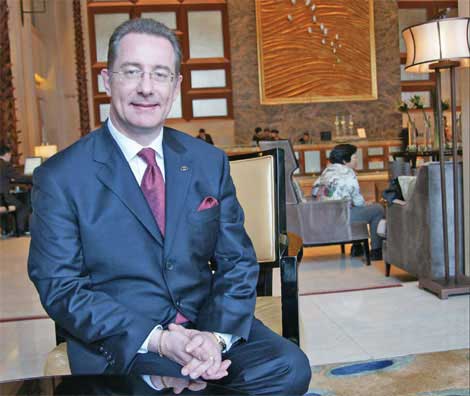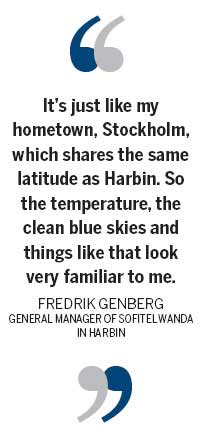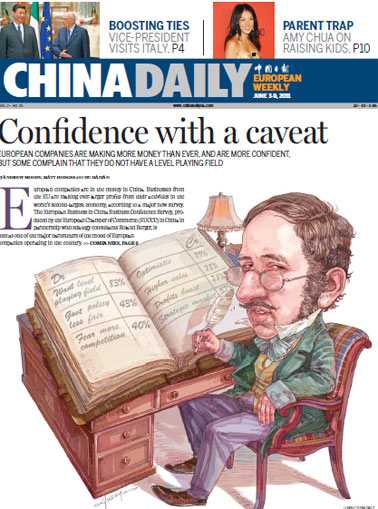Swede settles into cool comfort
Updated: 2011-06-03 10:58
By Lu Chang and Tian Xuefei (China Daily European Weekly)
 |
|
Veteran hotelier Fredrik Genberg says Harbin needs to boost its infrastructure and maintain quality services to lure new residents. Zhao Tianhua / for China Daily |
Hotel manager finds easy fit in Northeastern city's familiar climate and hospitality
Harbin, the capital of Northeastern Heilongjiang province, can seem like one of the last places on earth for an expatriate to live, with its severe winters of minus 30 C or lower.
But for Swede Fredrik Genberg, that is one of the main reasons he has made the city his home.
"What I like about Harbin is the weather. It's cool and not very humid, which makes it very comfortable to be outside," says Genberg, who has lived in Harbin with his wife and 3-year-old daughter for two years.
"It's just like my hometown, Stockholm, which shares the same latitude as Harbin. So the temperature, the clean blue skies and things like that look very familiar to me."
Genberg, 44, spent most of his married life in Malaysia as a chief operating officer for a five-star hotel.
His move to Harbin was also the result of his desire to live in China and his work commitment as general manager of the city's Sofitel Wanda.
The veteran hotelier of 25 years says he was sort of "in a midlife crisis" and got bored after serving Guoman International Hotels in Malaysia for eight years as a chief operating officer.
"Corporate work is nothing but wearing ties and suits and a lot of paper work. But I'm a people person. What I like about working in the hotel business is to talk with my clients and staff," he says.
"In combination, I also saw China's economic growth in the last decade, which I think, will keep for a long time."
So when there was a job offer as a general manager for a private business club in Guangzhou, Guangdong province, he took the chance and moved his family to China.
 |
Genberg and his wife, Lee Hoon Teen, a Chinese-Malaysian whom he met 20 years ago when he visited a friend in Malaysia, find Harbin "a place where one can easily fit in".
"It's not like Guangzhou, where people speak Cantonese. Harbin is ideal for foreigners to learn standard Mandarin, because it has no strong local dialect," Genberg says.
"I also enjoy working with Harbin people. They are quite straightforward and honest."
Genberg first came to Asia in 1988, working with top hotel chains in Hong Kong, Macao, Xi'an and Beijing, including Hyatt International hotels, Shangri-La Group and the Peninsula Group until 1993.
Genberg subsequently left to work in several other countries in Asia including Malaysia, Indonesia and Vietnam.
Genberg says his wife, who is 37, takes care of the family and makes it a lot easier for him to live long term in a foreign country, since she
has a mixed background of Chinese and Malaysian culture.
While he has been living in Harbin for only two years, Genberg has seen regular changes in Harbin all the time that help "keep the city getting better and better".
"Harbin's speeds hit me like a sack of bricks with lots of things like shopping centers, IMAX cinemas and high-end commercial areas coming up," says Genberg, who also believes the city's hospitality business is experiencing fast-track growth and will offer many opportunities.
The tourism industry has taken off substantially over the past two years, not just for the city's famous ice and winter activities, but also for summer attractions such as natural resorts with a mixture of Chinese and Russian cultures, that give the city a warm and special charm.
The Swede says Harbin is also "a developing city", with pillar industries such as the aircraft and automotive sectors that are set to accelerate its economic transformation and high-tech industrialization in recent years.
"As a result, there are lots of incentives for foreign companies such as Airbus, Boeing and General Motors to come and work with the local companies, because you have a very strong technological university here, which has very smart people," he says.
Yet, Genberg is also well aware that a second-tier city like Harbin lacks many of the features of a large metropolis, such as international education and medical care.
"As my contract will end next year, I don't mind staying personally because it's a nice hotel and we are doing very well with its people and everything," Genberg says.
"But at the same time, I also would like to move somewhere else for the family."
With his daughter turning 4 years old next year, Genberg and his wife have to decide what to do about her education.
But unlike cities such as Beijing and Shanghai, options are not so numerous and varied in Harbin. It is hard to find a wide array of both excellent local Chinese and international schools that accept foreign students with outstanding reputation and well-established home schooling groups.
Apart from international schools, healthcare services are another concern for Genberg's family, since visiting the hospital can be challenging for many foreigners. Most foreigners are more comfortable with doctors who speak their language and a system that is not confusing.
"It was quite difficult for my daughter last year because when she got sick, it was really hard to find an international hospital," he says.
Many international companies in Harbin are getting bigger with more foreigners heading to the city, Genberg says.
To help its development, Harbin needs to build infrastructure such as airport and highways as well as maintain quality international schools and medical services, he says.
"This is our biggest concern, otherwise I'd be happy to stay," Genberg says.
E-paper

Tapping into the future
Foreign companies are investing in China's water industry as many predict a growing profit margin.
Preview of the coming issue
Headhunters ride on growth
Commercial property rides wave
Specials

Cuisine central
London's Chinatown is helping diners appreciate full palate of Chinese food

Tying the knot
Danish couple's high-end macrame export business takes off in the mountains of Yunnan.

Truly a super woman
Li Yuchun first came to prominence in 2005 as the Super Girl winner, and since then has become an international star.
